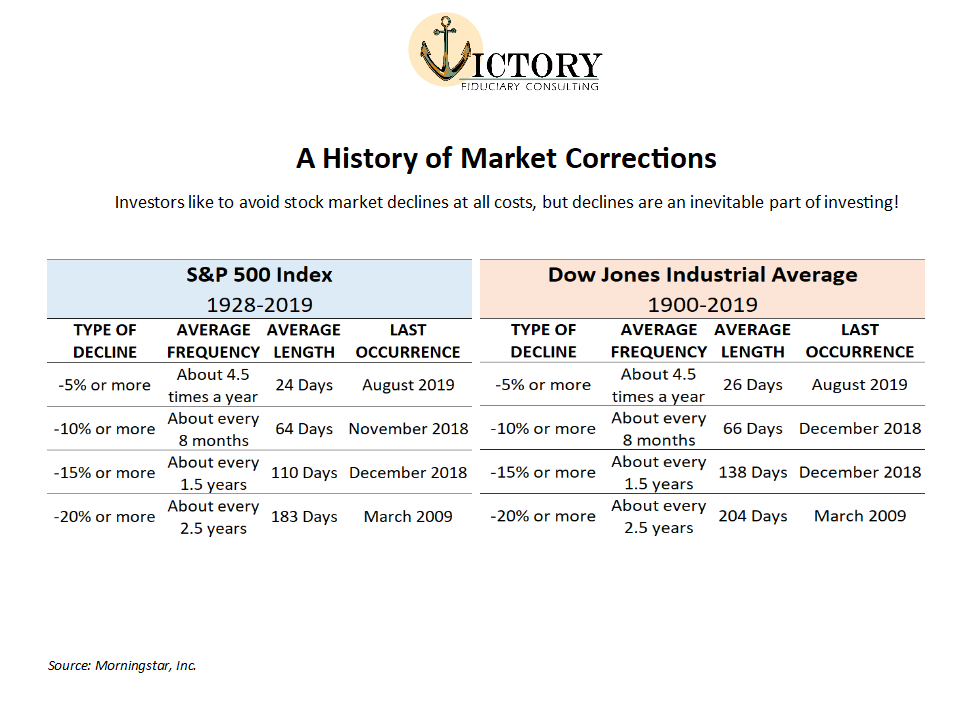Author Archives: vlm

Why We Went to Cash – Market Indicators
This article was hard for me to write this month. It almost seems trivial to write about financial matters when we are worried about our families staying safe and our businesses remaining open. When COVID-19 is over medically, we know we will have to assess the damage done financially. I do not take any of this lightly.
Click Here for a Recent Update >>>
I think there are important questions that investors should be asking right now. I wanted to share what our firm did for our clients and why it may be appropriate for you.
We went to cash. Yep. You read that right. We sold all our equity positions in the market. I know your saying “but that goes against everything my advisor is telling me to do”. Yes, we know. If you have been following my blogs, you may recall that we use a math-based program to help us determine how we should be invested. Our Investment Committee is comprised of five firms from across the nation which utilizes the same math-based program, and it has been around for over 30 years. The first question we answer is, should we be in the market or be in cash to preserve principal? Since May 2009, stocks have been the best place to be. All that began to change three weeks ago.
We track six indicators that help determine the overall strength of the stock market. When a majority are positive, we remain in the market. If 4 or more go negative, it is a sign that there are significant technical and fundamental underlying deficiencies in the market. The indicators are not affected by short-term volatility.
Initially, we observed minimal changes as the volatility was related to fear sell off and not underlying issues. But, as companies, industries, states and entire countries shut down, those indicators were changing rapidly. On March 12th, three indicators went negative, then another two on March 17th, meaning that five of our six indicators were negative. Our Investment Committee made the important decision to move all positions to either a government guaranteed money market or a stable value fund. These indicators also went negative in 2000 and 2008. The point is we have a stop loss in place that seeks to stop any further losses until conditions improve. Government stimulus packages will probably provide a temporary market uptick, but will have little impact on the underlying fundamentals and our indicators. In a market decline, think of a person walking down the steps with a yo-yo. The yo-yo goes up and down as the person is walking down the steps but the overall trajectory is still downward.
We also have a buy discipline. As our indicators begin to turn positive again, we will tactically transition by adding specific asset classes and sectors as appropriate. There will be a significant investment opportunity when that happens.
Our decision was not emotional but based on a very methodical process. These are the questions you need to ask. What is your sell discipline? When was the last time it was executed? How effective was it? Your buy discipline is just as important. If you do go to cash to preserve your principal and do not know when to enter back in the market, you may miss one of the most opportunistic times in history. If you are not encouraged by the answers, it may be time for a second opinion.
This month’s topic is definitely heavier than what I normally post, but given our current circumstances I felt it was necessary. If you would like further information on our investment methodology, I am happy to send you over a webinar that was recorded for all our clients. It gives an overview of the data that we used to help our decision-making process. We are willing to share it with you .
In closing, I would like to reiterate our hope for you and your family to remain healthy. I will be praying for all the small businesses in our community who are undoubtedly feeling the strain of social distancing policies. The United States will survive and when we come back, we will be stronger than before. We are here to help support our friends and neighbors however we can in the coming days and weeks. We are in this….together.
Prior to her career in the financial services industry, Ashley earned her Bachelor of Science in Nursing from Cedarville University.
Ashley decided to make a career change from her ten years within the healthcare industry as a pediatric emergency room nurse to retirement and 401K investment planning. She joined Victory Wealth Partners in 2008 after obtaining her Series 65 professional financial license and went on to earn her AIF (Accredited Investment Fiduciary) professional designation from the Center for Fiduciary Studies.

The Current Health of the Economy During the COVID-19 Outbreak
While reaction to the Coronavirus COVID 19 continues to remain top of mind, we want to bring attention to the current health of the economy. Generally speaking, we believe there are four different triggers that tend to lead to recession.
The health of the economy in four indicators
The first trigger we look at is unemployment. Just last Friday, it was announced that unemployment fell to 3.5%. In fact, the Labor Department reported that there were 273,000 new jobs in February, nearly 100,000 more than the anticipated number of 175,000.
The second trigger we look for is whether the Federal Reserve’s policy is too tight. When we say that the Federal Reserve’s policy is “tight,” this just means that they are raising interest rates to combat inflation. Currently, the Federal Reserve is loose, as they cut rates by 0.50% on Tuesday, in an attempt to curtail any short-term economic impact from the COVID 19.
The third trigger is overvalued stocks, as it may imply a bubble has formed. In 1999 before the Dot Com Bubble, the Price-to-Earnings ratio (a ratio used to measure stock valuation) for the S&P 500 index was 30.8. Today, this ratio is 22.2, well below the valuations we saw at the turn of the century.
Lastly, the final trigger is geopolitical risk. In a previous piece we wrote on February 5th, we observed every epidemic since 1950 in which there were at least 100 deaths. While one death is one too many from these epidemics, we wanted to objectively analyze how the markets have reacted to each of them. As a recap, the market saw positive returns in the 90, 180, and 365-day periods following the outbreaks, implying that they tend to have little impact on the markets in the intermediate term. In short, none of these four triggers are currently showing weakness.
As we have mentioned in previous articles, movement in the market is typically driven by one of three things: fundamentals, technical analysis, and emotion. Fundamentals in the health of the economy are still sound, with unemployment matching 50-year lows and the economy continuing to beat job growth projections. While supply chains will be affected in the short-term as companies adjust to supply shortages and shipment delays, we don’t believe there will be a long-term impact on these companies. While second and third quarter growth may show an impact, we believe that this will be a temporary decline as opposed to a prolonged issue. On the technical analysis side, our recession indicators continue to remain positive. As a refresher, these indicators would have caused us to exit the market in December of 2000 and July of 2008, well before the worst of each of those recessions. However, these were the only two times in the past 20 years that our indicators would have shown a negative reading. In fact, every indicator was positive through the 2018 correction that saw the S&P 500 fall 19.78%. Sure enough, it was a correction and we recovered with a strong 2019. While we can’t guarantee the same will happen this time, none of the indicators have shown weakness. Lastly, emotional overreaction can drive the markets. Since both the fundamentals and technical indicators are showing strength, we are inclined to believe that this is the driving force behind this market correction.
Like we mentioned in “A History of Market Corrections,” market corrections are a healthy part of investing, as they prevent the stock market from becoming overinflated in value after periods of rapid growth (like the growth we saw in the fourth quarter of 2019). Market corrections historically occur an average of every eight months, and they typically include a catalyst that causes it. In 2010, it was Greece requiring a bailout. In 2015, it was slowing Chinese economic growth. Today, it is a fear of how supply chains will be interrupted due to the Coronavirus COVID 19. It can be difficult to remain disciplined in volatile times, but that is what we strive to do at Victory Wealth Partners. We will continue to analyze the health of the economy and market daily, and we will inform you if we see any material changes in market conditions. However, since we have yet to see any changes, we will continue to stay the course. Volatile times remind us of a letter written by Dean Witter on May 5, 1932:
“Dear Clients, All of our customers with money must someday put it to work-into some revenue producing investment. Why not invest it now, when securities are cheap? Some people say they want to wait for a clearer view of the future. But when the future is again clear the present bargains will have vanished. In fact, does anyone think that today’s prices will prevail once full confidence has been restored? Let us face it-these bargains exist only because of terror and distress. And when the future is assured, the dollar will have long since lost its present buying power. It takes courage, of course, to be optimistic about our country’s future when nearly everyone is pessimistic. But it is cowardly to assume that the future of the United States is in peril.“
It can feel unnatural to be greedy when others are fearful, and it can feel unnatural to be fearful when others are greedy. However, following this old adage has been a sound guide through market history. Stay strong, stay disciplined, and don’t hesitate to reach out if you have any questions or concerns.
 Bud Verfallie, CEO
Bud Verfallie, CEO
Bud holds several professional designations including: AIFA (Accredited Investment Fiduciary Analyst/Center for Fiduciary Studies), PPC (Professional Plan Consultant/Financial Service Standards), and CFP (Certified Financial Planner/College of Financial Planning), ranking him in the top 1% of all Investment Consultants nationally.
Bud has been an instructor/trainer for over 25 years. Subjects include: “How to Initiate a Successful Asset Management Business in Your Accounting Firm”, “Converting Your Commissioned-Based Investment Practice to Fee-Based”, “How to Establish an Asset Management Practice”, and “Investments and Financial Planning.” Bud has taught financial planners CFP Preparatory classes for the NIF.
Prior to her career in the financial services industry, Ashley earned her Bachelor of Science in Nursing from Cedarville University.
Ashley decided to make a career change from her ten years within the healthcare industry as a pediatric emergency room nurse to retirement and 401K investment planning. She joined Victory Wealth Partners in 2008 after obtaining her Series 65 professional financial license and went on to earn her AIF (Accredited Investment Fiduciary) professional designation from the Center for Fiduciary Studies.

A History of Market Corrections
While the talking heads continue to stoke the flames of hysteria regarding the Novel Coronavirus, we would like to provide a follow-up to our previous article, “Do Global Flus Cause Market Blues”. If you have not read that article yet, we highly suggest you do. We discussed how recent volatility has seemed more pronounced due to an abnormally calm fourth quarter, as well as how the market has reacted to previous epidemics that have had a death toll of at least 100 people. As a recap, the market has averaged positive returns in the 90, 180, and 365-day periods following the initial outbreak, implying that there are other factors that have a much greater impact on the market. This time, however, we would like to discuss a phrase that is thrown around during times of volatility: market corrections.
In the same way a car’s engine can overheat, the stock market can overheat after periods of sustained and, more often than not, rapid growth. At the peak of these growth periods, stocks prices may have even increased faster than their actual underlying value. In these instances, the stock market typically enters a market correction. To put it simply, a market correction is a temporary resetting of market prices. Market corrections typically involve the market falling at least 10%, but they can even fall as much as 20%. In fact, the 2018 correction saw the S&P 500 index fall -19.78%. While no investor wants to see their account down 10%, market corrections are a vital and healthy aspect of our stock market.
As was previously mentioned, market corrections help to prevent the market from becoming egregiously overvalued. Just as the Federal Reserve adjusts interest rates to control inflation, market corrections act as a check on the stock market. While certain asset classes and sectors of the economy can go through isolated corrections, a market correction tends to affect all areas of the market at once. Once the market has seen a broad pullback amongst the sectors of the economy, stocks will once again continue their growth at their newfound prices. In short, market corrections help to ensure our stock market is at a healthy level and valuation.
Now that we have a better understanding of what a market correction entails, the next question is: when do they occur? Unfortunately, there is no crystal ball for predicting corrections. However, we can look at history to create realistic expectations of investing. In the two tables at the end of this piece, you will find a table each for the Dow Jones Industrial Average and the S&P 500, the two major U.S indices. The tables look at each index to observe the frequency of market pullbacks through history. In these tables, you will notice that pullbacks in the market are frequent throughout history. In fact, both indices have historically had a 10% or worse correction every 8 months! For perspective, the market has not had a correction of at least 10% since the end of 2018, meaning that, if history is to be our guide, we have been overdue for a correction. As of Thursday’s market close, we have surpassed the 7% pullback for the S&P 500 and 9% for the Dow Jones. While we can’t know for certain whether this will be closer to the pullbacks of the 2018 correction, we know that history shows us that corrections are a natural and relatively frequent occurrence in our markets.
Finally, the burning question on everyone’s mind: what should I do? While it is much easier said than done to stay the course during a correction, it is imperative that we remain diligent and long-term investors. We are reviewing the market and each asset class daily to see if there are any trend changes,
and we will make adjustments as needed. However, our six recession indicators remain positive, just as they did through the 2018 correction. If we observe any changes to these indicators, we’ll be sure to let you know. In the meantime, our best advice is to remain calm and stay informed. We will continue to do our best to provide you with relevant updates and information, but feel free to reach out to us if you have any questions or concerns.
Thank you,
Bud Verfaillie & Ashley Rosser
Victory Wealth Partners
Anchored in Compliance
53 N. Main St
Mullica Hill, NJ 08062
Office: 856-464-3100
The opinions voiced in this material are for general information only and are not intended to provide specific advice or recommendations for any individual. All performance referenced is historical and is no guarantee of future results. All indices are unmanaged and not to be invested into directly.
The Standard & Poor’s 500 Index is a capitalization-weighted index of 500 stocks designed to measure performance of the broad domestic economy through changes in the aggregate market value of 500 stocks representing all major industries. The Dow Jones Industrial Average Index is a price-weighted index of 30 stocks designed to measure performance of the broad domestic economy through changes in the aggregate market value of 30 stocks representing all major industries.

Is it Time to Leave Your Current Investment Holdings?
Do you know if it is time to leave your current investment holdings or even the stock market in general? Should I stay or should I go now? As the song goes “if I go it will be trouble but if I stay it could be double”. Of course I am not talking about relationships, rather I am referring to when you pull the trigger to sell your positions. Do you have a buy-sell discipline? Unfortunately for most investors, they do not have a formal process that determines if they should make major changes to their investment holdings. Rather, they make changes based on emotions or after something significant happens within the market. This is NOT a very good long-term strategy because unfortunately you are probably hurting your portfolio rather than helping it. Selling your holdings after they have gone down in value or buying positions after they have shot up in value are the equivalent of buying high and selling low. There can always be costs associated with mistiming both exiting and entering the market.
Don’t Leave your current investment holdings because of the nightly news
There is currently significant market volatility thanks to the corona virus outbreak. Many are wondering if this will have a long-term negative effect on their investments. As an Investment Committee, we conducted a study on the long-term effects of new disease outbreaks. We looked at the last 25 epidemics where at least 100 fatalities occurred, which took us back to the 1950’s. Most of the volatility was short-term, occurring in the first 60 days of each new event. If you would like a chart showing the specific epidemics and the volatility associated with specific periods, please contact us. Currently, we are not making any changes to our Investment Models. The stock market in general can be somewhat erratic, although if you have a sound investment management and screening process it can be more predictable that you may realize.
The investment strategy used by our firm, has a well-defined “buy-sell discipline”. This essentially means that there are very specific factors that help us determine when we should be in the market (versus investing in cash) as well as what specific areas of the market appear to offer the best opportunities. We will invest in areas of the market that show stronger performance momentum and conversely avoid areas with weaker momentum. All areas of the stock market will not be strong or weak at the same time. Wouldn’t it be nice to know what areas of the market are currently having strong or weak momentum BEFORE you invest? We decide what specific asset classes and sectors we include in our models based on how strong those areas are performing in current time. Many advisors employ a buy and hold method. They invest in the same asset classes over the long run. They make occasional FUND changes, but they do not change the underlying asset classes and sectors that comprise their portfolios. They periodically rebalance accounts to take from the areas that overgrew and give back to the areas that underperformed. We do not rebalance accounts, which essentially means take from the winners and give to the loser funds. Rather, we keep our models invested in the winners, until the momentum shifts and then we reallocate to a new area that is showing positive performance momentum. We keep our winners until they stop winning.
Only Leave your current investment holdings When ALL Major indicators point to sell.
The last and possibly most important distinction is we have a stop loss set up in our methodology that alerts us if we should consider leaving the market all together. We look at six distinct indicators and if four or more of those indicators turn negative, it is our sign that the stock market will not be the best opportunity for our clients and therefore we will move to cash until a majority of those indicators turn positive again. We will take what the markets will give us, and during the years the markets will be volatile and negative we are willing to be defensive to protect our client’s previous returns and principle. How desirable would it have been to have missed the vast majority of the 2008-2009 financial meltdown?
It is important as an investor to understand there are significant implications associated with both how your current portfolio is invested as well as timing when to get in or out of a specific asset class, sector, or the market in general. You should know if your advisor has a formal buy-sell discipline or they if use a buy and hold and rebalance method. You should also find out if there is a formal stop-loss discipline in place to alert if they should consider moving your account out of the market due to a significant downturn. If you are unsure, we would be happy to help you evaluate your current portfolio. It really is important to know “should you stay or should you go.”
Prior to her career in the financial services industry, Ashley earned her Bachelor of Science in Nursing from Cedarville University.
Ashley decided to make a career change from her ten years within the healthcare industry as a pediatric emergency room nurse to retirement and 401K investment planning. She joined Victory Wealth Partners in 2008 after obtaining her Series 65 professional financial license and went on to earn her AIF (Accredited Investment Fiduciary) professional designation from the Center for Fiduciary Studies.

Setting Every Community Up for Retirement Enhancement SECURE Act
Are you familiar with the SECURE Act passed by congress recently? As we start a brand-new decade, many are unaware of this significant bill that was recently passed and is designed to help Americans better prepare for retirement. The Setting Every Community Up for Retirement Enhancement – SECURE Act has many different implications for both the individual retirement investor as well as employers who offer retirement plans. Many investors are unable to keep up with every retirement law as they can be complex to understand and can change frequently. Unfortunately, this means there can be missed opportunities to take advantage of or the potential for negative consequences if the law is not followed. Therefore, it is important to consider finding a financial advisor who keeps up with changes in the industry and relays important information on to their clients. I am going to highlight three areas of the SECURE Act that are important for individual retirement investors to understand.
The first is the changing required minimum distribution age (RMD) from age 70 ½ to 72. This means investors who are no longer working have an extra year and a half before they must begin paying taxes on their qualified accounts. Retirees may still take withdrawals without penalty any time after age 59½. However, as more people work beyond the “traditional” retirement age, and as we continue to live longer, Uncle Sam is giving us an extra 18 months before we must start taking money (and pay the necessary taxes) from our retirement accounts. Individuals who have already begun taking their RMDs prior to 2020 must continue to do so.
The SECURE Act also repeals age restrictions for contributing to IRAs. Individual investors who have earned income will now be able to continue contributing to IRAs beyond the age of 70 ½. It is no surprise that Americans are working longer so it makes sense to allow investors to contribute for longer.
Non- Spouse Inherited IRAs are significantly affect by the SECURE Act because the entire balance of the inherited IRA must now be withdrawn within ten years. Previously, beneficiaries were able to withdraw the account over the course of their own lifetime, otherwise known as a stretch IRA. Tax implications could be quite significant for an inherited IRA since they must be dispersed over a shorter time frame. Exempted beneficiaries to this change include surviving spouses, minor children up until the age of majority, individuals within 10 years of age of the deceased, the chronically ill and the disabled.
These are just three of the changes to individual retirement accounts that are a result of the SECURE Act as there are quite a few other changes not highlighted here. I recommend you consider meeting with a financial advisor who is also a fiduciary to review your accounts and determine if you should make any changes to your current investment plan. A fiduciary is legally obligated to give you advice that is in your best interest. Not all financial advisors take a fiduciary approach so don’t be afraid to ask them if their agreement specifically states that they will be acting as a fiduciary in their relationship with you. As always, the team at Victory Consulting would be honored to sit down with you and help you review your current investment strategy. Best wishes for a prosperous 2020.
 Ashley Rosser, President
Ashley Rosser, President
Prior to her career in the financial services industry, Ashley earned her Bachelor of Science in Nursing from Cedarville University.
Ashley decided to make a career change from her ten years within the healthcare industry as a pediatric emergency room nurse to retirement and 401K investment planning. She joined Victory Wealth Partners in 2008 after obtaining her Series 65 professional financial license and went on to earn her AIF (Accredited Investment Fiduciary) professional designation from the Center for Fiduciary Studies.

Three Financial Strategies for the New Year
What are your financial strategies for the new year? New year, new you. Isn’t that what we all think about from now until the end of the year? How can we make the new year a better one than the previous? We sign up for Gym memberships, declutter our homes, resolve to be more positive, less stressed. Many times we also often vow to make better financial decisions. “This is the year we budget more, spend less. We will save for retirement, build up those college savings accounts”. Sound familiar? I would like to spend a few minutes talking about how you can make 2020 the best financial year of your life.
3 Financial Strategies for the New Year
Financial Strategies for the New Year: #1 Pay yourself first.
Sounds simple right? It is. Decide that you are going to pay a pre-determined amount to your 401k, IRA, or other savings accounts every month and stick with it. Consider it like a bill and eventually it will become habit. Are you thinking that you aren’t sure if you have any extra money left over to pay yourself? Consider that no matter how tight of a budget you run, there is probably 2% of your income that you would not be able to account for. It literally just vanishes each month. Decide for that 2% to appear in your 401k or IRA instead. I usually recommend people increase their savings my 1% every year. It’s like giving yourself a raise and will pay off for you in the long run.
Financial Strategies for the New Year: #2 Put your investment accounts on a budget.
By this I mean, find ways to cut unnecessary expenses from eroding your returns. There are always going to be expenses associated with investment accounts. Unfortunately, sometimes fees are much higher than necessary and they will literally sabotage accounts over a long period of time. If I asked you how much you spend on your cable bill or cell phone each month, you probably know almost to the dollar. If I asked you how much you spend on your investment accounts with all the fees associated, you would probably say “I have no idea”. Consider finding a fiduciary who can sit down with you and itemize out all the expenses within your accounts and then help you determine the reasonableness of them.
Financial Strategies for the New Year: #3 Make sure your investment advisor is working for you.
There are different advisor relationships. The only one that has the legal obligation to act in your best interests first is a fiduciary. Surprised? Most investors have no idea what type of advisor they are working with. Some are paid via commissions; some are paid from the fund companies they recommend and some are paid via level fee arrangements. How do you feel about an advisor who only makes money if he changes funds around in your account? Did you know most advisors will not be able to consistently outperform the S and P 500 over a consistent time period? Considering excessive fees combined with antiquated investment strategies often lead to lagging performance. Our firm uses a dynamic investment methodology that allows us to choose where we invest assets based on current market momentum, not past performance. We are able to identify the winning and losing areas of the market by using a math-based program that tracks supply and demand in the stock market. We avoid weak areas of the market which allows us to strive to outperform the S& P 500 index by at least 1% each year.
As we begin the new year, it is a great time to make sure you are the healthiest you can be both physically and financially. Start off this January giving your retirement account a raise, putting expensive investment accounts on a budget and making sure your advisor is working hard for you. With a little work and forethought, you can make 2020 your most financially healthy year yet. Merry Christmas and Happy New Year from the team at Victory Wealth Partners!
 Ashley Rosser, President
Ashley Rosser, President
Prior to her career in the financial services industry, Ashley earned her Bachelor of Science in Nursing from Cedarville University.
Ashley decided to make a career change from her ten years within the healthcare industry as a pediatric emergency room nurse to retirement and 401K investment planning. She joined Victory Wealth Partners in 2008 after obtaining her Series 65 professional financial license and went on to earn her AIF (Accredited Investment Fiduciary) professional designation from the Center for Fiduciary Studies.

Things this Advisor is Thankful for this Thanksgiving
I can hardly believe that I am writing this, but Thanksgiving is literally right around the corner. While I try to practice the art of being thankful, it seems this time of year we all try to focus on it just a little bit more. The whole topic of “what am I thankful for?” led me to start thinking about some of the things I am thankful for as a financial advisor and I thought I would share them with you.
I am thankful for having an investment strategy
I am so thankful for having an investment strategy that has significantly improved our ability to help our clients accumulate wealth. Our non-emotional, rules-based investment program allows us to have higher exposure to asset classes and sectors that are performing strongly under current market conditions. All the while, limiting exposure to those areas that are underperforming and will most likely continue to underperform. Supply and demand control the market, and we can observe what areas are overbought or oversold and build our investment models based upon this information. Finding ways to increase and preserve our client’s wealth is an essential part of our job as financial advisors.
I am thankful that more people are becoming educated
I am also thankful that more people are becoming educated about how to best advocate for themselves when they are looking for a financial advisor. They are starting to search for terms like “fiduciary” and understand how important it is to have a financial advisor legally obligated to put your best interest first. While fiduciaries are less predominant in the industry and can take a little extra research to find, the benefits of having non-conflicted advice is truly priceless. People are also finally realizing that costs really do matter inside their investments and over time, excessive fees can be extremely detrimental to their overall account balance. They want technology available to help them make impactful decisions that will ultimately help them achieve success. The only way our industry can continue to evolve and become better for our consumers is if the consumers continue to demand better for themselves.
I am thankful for our clients
Finally, what I am most thankful for is our clients and the experiences and relationships they have brought to me. We understand the trust that is necessary to choose to work with an investment advisor and we do not take that lightly. I am thankful for a career that allows me to build relationships that help our clients feel confident that their finances are being taken well care of. I am grateful for the opportunity to use the skills I learned in my 10 years as a pediatric emergency room nurse and use them to help educate and empower our clients so they can make great financial decisions. Every day is an opportunity to learn something new and to make a difference in our client’s lives. That is a lot to be thankful for! So, from the team at Victory Wealth Partners we would like to wish you and your family a very Happy Thanksgiving!
 Ashley Rosser, President
Ashley Rosser, President
Prior to her career in the financial services industry, Ashley earned her Bachelor of Science in Nursing from Cedarville University.
Ashley decided to make a career change from her ten years within the healthcare industry as a pediatric emergency room nurse to retirement and 401K investment planning. She joined Victory Wealth Partners in 2008 after obtaining her Series 65 professional financial license and went on to earn her AIF (Accredited Investment Fiduciary) professional designation from the Center for Fiduciary Studies.

Finding the Right Investment Plan Doesn’t Have to be Scary.
Finding the right investment plan doesn’t have to be scary. Halloween is here and if you are a kid (or kid at heart) you can’t wait to get dressed in your favorite costume. You may even get “spooked” by a ghost if you are lucky. However, finding the right investment plan does not have to be scary. Here are a few ways to make sure your investment account is filled with treats not tricks.
Don’t get tricked by spooky share classes within your portfolio. Did you know advisors can use different share classes for the mutual funds inside investment accounts? Some share classes pay additional revenue to advisors known as “12 b-1 fees”. Revenue sharing is when mutual fund companies pay your financial advisor an extra incentive or commission for recommending their mutual funds instead of other funds. Other share classes may charge a high up front cost in order to invest, or may cost you additional money if you withdraw from the fund at a later time. Institutional share classes are typically the lowest cost fund. They charge only the cost of the underlying fund’s management without any additional fees or expense. As a rule of thumb, try to use institutional or non-commissioned “no load” funds and stay away from other more expensive share classes that can be a drag on your account’s overall performance. Remember costs do matter when it comes to your investments, so ask your advisor what share classes they will recommend for your portfolio. You can hire an independent fiduciary to conduct a full analysis of your current holdings and help you determine if you are receiving great value. Don’t let excessive investment fees haunt your portfolio.
Don’t get booed by your financial advisor. A well thought out investment strategy can help you increase your chances of achieving your financial goals. One significant piece to this is finding a qualified financial advisor to help you. If you can find an advisor who is a fiduciary, they are legally required to give you advice that is in your best interest only. Many advisors fall under what is called a “suitability” requirement. This means any investment product they are recommending to you doesn’t have to be a better investment, it just has to be “suitable” for your age, risk tolerance, etc. Very few advisors fall under a fiduciary requirement meaning the advice you are paying for, by law, has to be in your best interest and require full disclosure of any possible conflicts of interest. CEFEX certified advisory firms take it further by demonstrating adherence to the Global Fiduciary Standard of Excellence. When client interests are placed first and conflicts of interests are removed, client outcomes can be significantly improved. No tricks here!
Making sure your investments are collaboratively working together is not a bunch of hocus pocus. If you spend a lot of time talking to your advisor about your individual investment accounts, but never discuss how to invest your 401k at work, you are missing out on a key piece to your eventual retirement plan. You probably have short term, intermediate, and long term financial goals for your investments. Make sure your overall financial plan incorporates these. One way to do this is to choose an advisor who offers sophisticated software projections as part of your planning. You can see how different scenarios could impact your future and allow those outcomes to guide your decisions today. Some advisors even offer client portals that allow you to track your individual accounts, create budgets, and take control of important financial decisions from the comfort of your home laptop. No secret spells necessary, we simply believe the more power we can give our clients, the better outcomes they achieve.
Need help Finding the right investment plan?
We know making decisions for your financial future can be downright scary, but it really does not have to be! With the right education, knowledge, and perspective we believe any investor has the power to make great financial decisions. We would love to talk with your today about your current situation to see if there is anything we can do to help you keep “tricks” out of your investments.
Happy Halloween!!
 Ashley Rosser, President
Ashley Rosser, President
Prior to her career in the financial services industry, Ashley earned her Bachelor of Science in Nursing from Cedarville University.
Ashley decided to make a career change from her ten years within the healthcare industry as a pediatric emergency room nurse to retirement and 401K investment planning. She joined Victory Wealth Partners in 2008 after obtaining her Series 65 professional financial license and went on to earn her AIF (Accredited Investment Fiduciary) professional designation from the Center for Fiduciary Studies.

How to Be a Responsible Investor During Times of Uncertainty
Let’s look at how to be a responsible investor during times of uncertainty. There is no doubt that many Americans are feeling weary of the future of the stock market. After a sweet ride down easy street for the past ten years, many investors opened up statements in January and saw their accounts had negative performance. “I lost money.” It is hard to open up that 401k statement and not feel a sense of fear and regret when the ending number is less than the opening number. Thankfully, the markets have rebounded and most of those negative returns have climbed back to positive numbers. However, it is still raw in investor’s minds and many are wondering “what next?”
As a financial advisor, this opens up a wonderful opportunity to educate investors who up until this year didn’t really care too much about how they were invested. All they knew was that they were making money and everything was “fine”. The problem is that “fine” can turn into “definitely not fine” if no one is watching your accounts and making sure you are invested appropriately. I would like to offer a few suggestions for investors to consider, regardless of market conditions.
Make sure you know how your account is currently invested and why those specific funds/ETF’s are a part of your portfolio. Does your advisor use a tactical approach while constructing your investment line up? Instead of just buying across all asset classes and holding them for the long term (you may know this as diversification) we use a strategy that allows us to strategically invest only in areas of the market that have strong positive momentum and performance. This strategy steers us to areas that are doing well and should continue to do well, and steers us away from areas that are showing poor momentum. As an example, our current tactical models have no exposure to emerging markets or international stocks. Why? Because it’s performance has been weak at best and a drag on overall performance. When it’s momentum shifts to favorable again, we will consider adding it back to our models.
Understand the costs that are charged within your account. I have found so many investors have virtually no idea how much their accounts are actually costing them. They are often surprised after we pull back all the layers and show them how much money has gone to expenses. No investment account is free and certainly you will need to be willing to pay for professional counsel and management. But, if left unchecked, excessive fees can wreak havoc on a portfolio’s overall performance over the long run. Make sure you know what fees you pay and then you can determine the reasonableness of them.
Finally, and probably most importantly, to be a responsible investor you should know who your advisor is working for. Many investors believe that when they hire an advisor, the advisor HAS to work for their clients first and foremost. Spoiler alert, if they are not a fiduciary then they probably work for someone else. Stock brokers and insurance agents work for their employers first. Their recommendations have to be suitable, but not necessarily the best option for you. Many people are surprised to hear this. I often say that placing our client’s best interests above our own sounds like common sense, but it’s not necessarily common practice. Fiduciaries on the other hand, have a legal obligation to put their client’s needs above their own. Would you feel more comfortable working with a team who is legally obligated to act in your best interests first?
We understand that investing in the stock market can be confusing and at times even a little scary. This could be a great time to sit down with a fiduciary who can help you take a deeper look at your current investments and make sure you understand your options when it comes to investing. We would welcome the opportunity to help you become a more responsible investor; especially during times of uncertainty in the market.
 Ashley Rosser, President
Ashley Rosser, President
Prior to her career in the financial services industry, Ashley earned her Bachelor of Science in Nursing from Cedarville University.
Ashley decided to make a career change from her ten years within the healthcare industry as a pediatric emergency room nurse to retirement and 401K investment planning. She joined Victory Wealth Partners in 2008 after obtaining her Series 65 professional financial license and went on to earn her AIF (Accredited Investment Fiduciary) professional designation from the Center for Fiduciary Studies.

When Your Investment Accounts Go from Hot to Cold
What do you do when your investment accounts go from hot to cold? With the end of August here, summer is winding down. As if we needed the reminder, it seems the weather felt the need to rub it in. The temperature outside has dropped, going from hot to cold with little warning. It always amazes me how fast the weather can change.
Much like seasonal swings in weather, the stock market can surprise investors with sudden changes. It has been a wild ride on Wall Street this past month. Investors saw the worst trading day of the year and the media added to the frenzy with headlines screaming things like “inverted yield curve” and “looming recession”. Market volatility (like what we have seen this month) can cause investors to make knee jerk decisions out of fear rather than education and understanding. So, how should investors react when their investment accounts are going cold?
Your first response should be: nothing. Surprised? Making a big investment change in your portfolio based solely on short term market conditions is likely going to be more harmful than helpful. I often tell our clients “if your goals and situation have not changed since last month, most likely your portfolio should also not require changes”. While no one has a crystal ball, most investor commentators agree that the most recent volatility we have experienced is tied to the US-China trade dispute. While it seems that any chances of closing the trade deal this year have diminished, most experts do believe that the markets have priced themselves to include the stalemate we are in with China. To sell positions now would lock in any losses and would risk missing the next recovery and upswing.
What can you do? I find many investors question their current strategy when markets decline. One thing investors CAN do is make sure they understand what investment accounts strategy is currently being used to manage their investments. Are changes being made reactively, after markets have experienced a change? Is there a specific buy and sell discipline that is used to determine what areas of the market you are exposed to? What system does your current advisor use to determine how you are invested, and when changes need to be made? For example, we use a sophisticated, math based approach that allows us to invest in areas of the market that are performing well and that steers us away from areas that are performing poorly. The investment methodology that we use acts like an early warning system, picking up on changes in the stock market supply and demand system. We have a clear buy and sell discipline which helps us stay invested in winners longer and alerts us when we should sell an underperforming area. You should understand how your account is invested and the methodology that is being used.
If you are unsure what current strategies are being used in your account or if you are just interested in having a second opinion I would love to review your current portfolio with you. Our initial meetings are always complementary and educational. We know how nerve wracking it can be to see your investment accounts go from hot to cold without warning. At Victory, we strive to give you the education, perspective, and insight needed to make great decisions; regardless of the current market temperature.
 Ashley Rosser, President
Ashley Rosser, President
Prior to her career in the financial services industry, Ashley earned her Bachelor of Science in Nursing from Cedarville University.
Ashley decided to make a career change from her ten years within the healthcare industry as a pediatric emergency room nurse to retirement and 401K investment planning. She joined Victory Wealth Partners in 2008 after obtaining her Series 65 professional financial license and went on to earn her AIF (Accredited Investment Fiduciary) professional designation from the Center for Fiduciary Studies.













